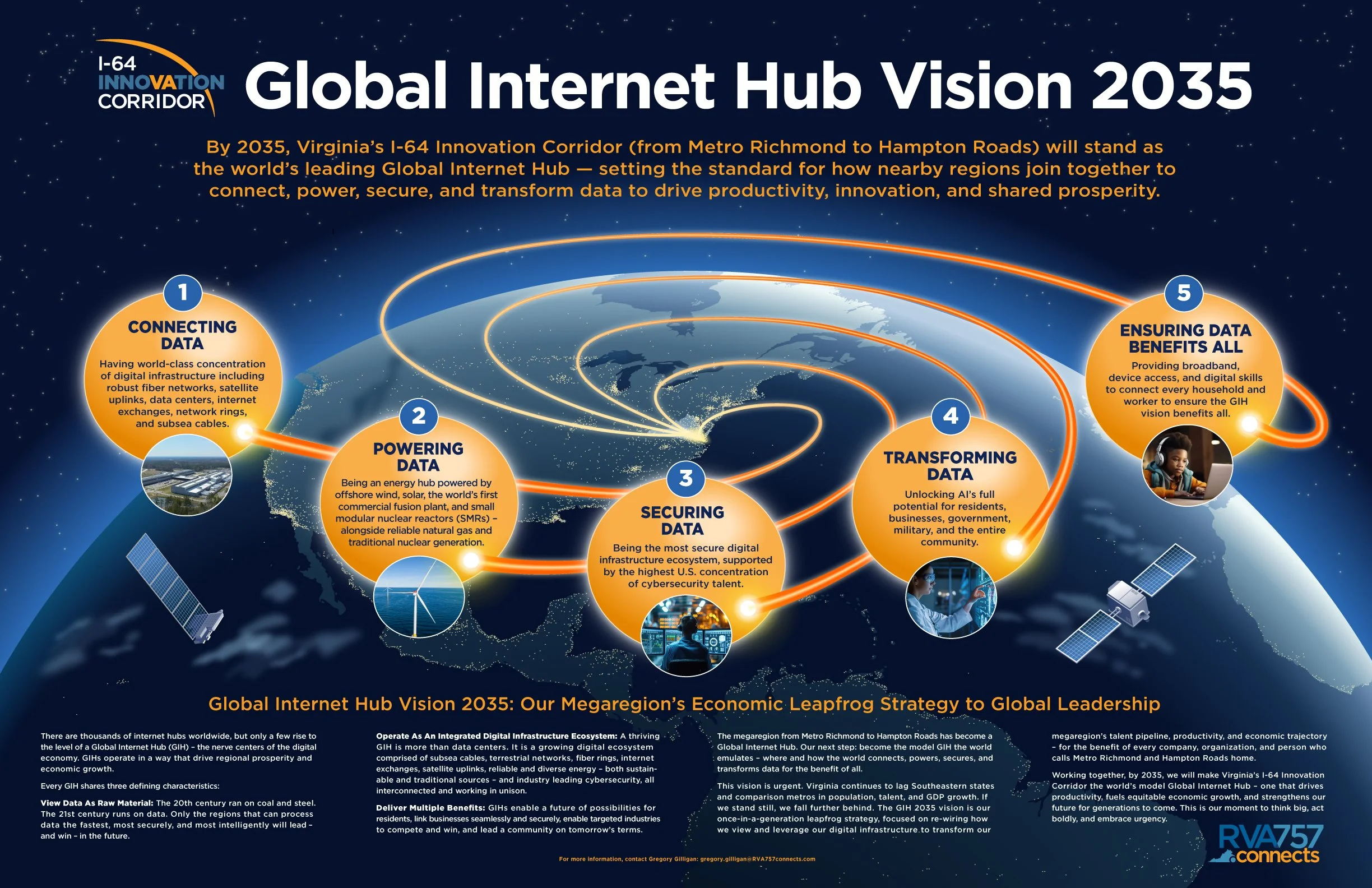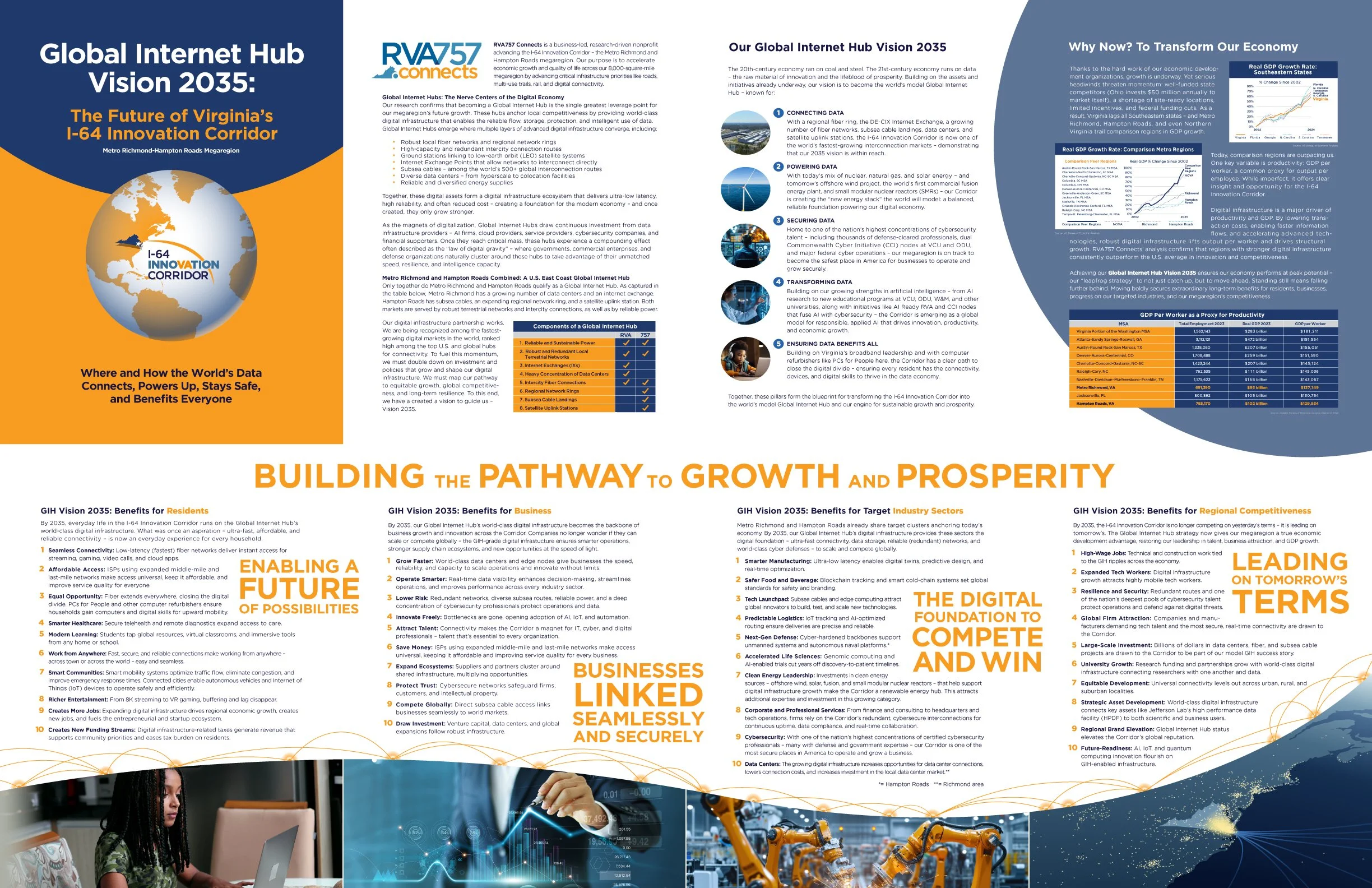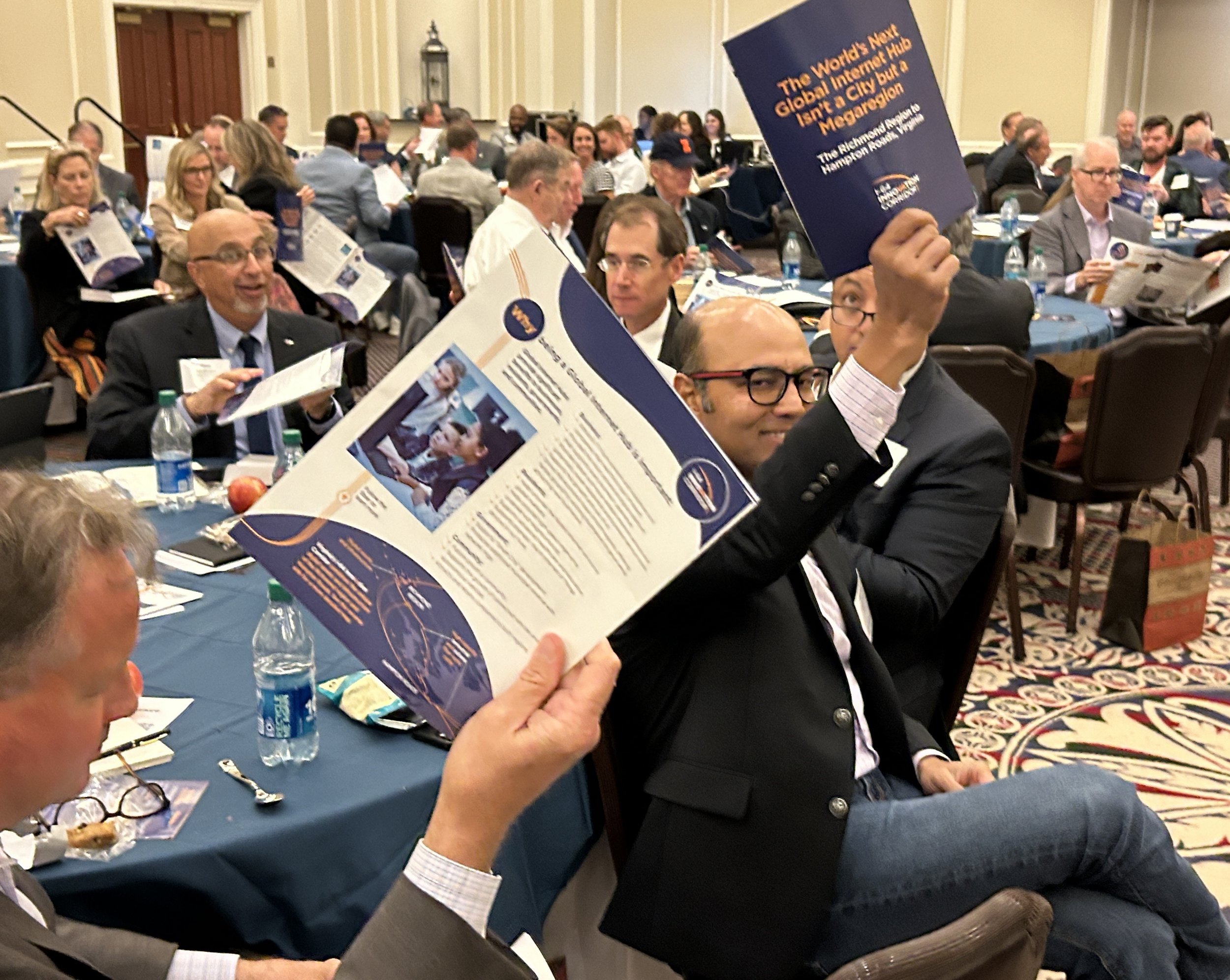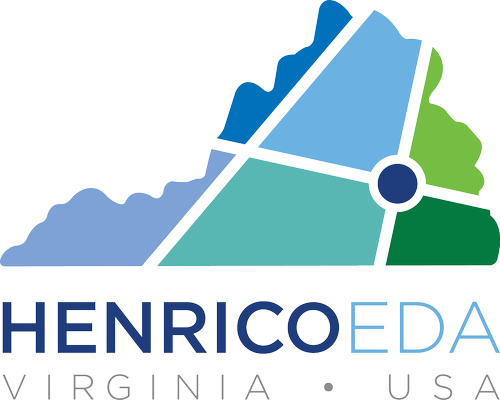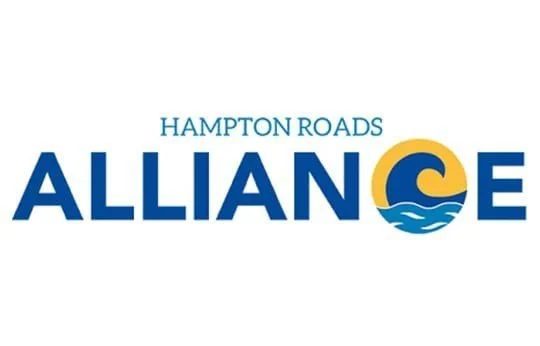
Becoming the World’s Next
Global Internet Hub
The I-64 Innovation Corridor’s
Global Internet Hub Vision 2035
Presented at the Convergence 2025 conference on November 18, 2025
The world’s next Global Internet Hub isn’t a city, but a megaregion:
The Richmond region and Hampton Roads
Presented at the Convergence 2023 conference on September 28, 2023
Global Internet Hub Strategic Plan report
The Global Internet Hub Steering Committee identified 10 strategies in order to make the I-64 Innovation Corridor one of the world’s recognized Global Internet Hubs.
This bold plan – a once-in-a-generation opportunity – will be transformative for the megaregion.
The key to the I-64 Innovation Corridor becoming a Global Internet Hub is combining the digital assets of both the Richmond region and Hampton Roads.
Global Internet Hubs have seven core interrelated components that define their world-class digital infrastructure. The Richmond region and Hampton Roads together have all seven of these components and more.
Accelerating the buildout of the digital infrastructure in the I-64 Innovation Corridor will ensure that the high-paying jobs of the future and the industries of tomorrow will be here.
Virginia, and specifically the megaregion, needs to have those kinds of jobs to grow the state’s economy. The Richmond and Hampton Roads markets are behind in growing their IT/tech talent workforce when compared to the national average and to their peer markets.
What are Global Internet Hubs?
Why are Global Internet Hubs Important?
Global Internet Hubs play a vital role in enabling the flow of information and communication across the internet, serving as the backbone of the digital economy and underpinning virtually every aspect of modern society.
A Global Internet Hub is a physical infrastructure that facilitates the exchange of internet traffic between multiple networks, telecommunication carriers, internet service providers (ISPs), content delivery networks (CDNs), social networks, cloud services, and other interconnected entities.
Hubs serve as major points of convergence, facilitating the exchange of data between different networks and enabling global connectivity.
Some key characteristics and components of Global Internet Hubs include::
physical infrastructure (typically large data centers equipped with high-capacity networking equipment);
network interconnection points through direct peering agreements or through internet exchange points (IXPs);
content distribution allowing providers to distribute content closer to end-users and improve performance;
Internet Exchange Points (IXPs) that provide neutral meeting points where multiple networks can exchange traffic; and
subsea cables that provide the primary means of international connectivity with high-speed, low-latency communication between different continents.
Global Internet Hubs around the world attract a growing level of business interest and investment.
Hubs play a crucial role in optimizing network routes and fostering a robust and interconnected digital ecosystem.
Hubs enhance the speed, reliability, and overall performance of the internet. Bringing together multiple networks, hubs reduce the distance that data must travel between different regions, minimizing latency and improving the overall speed and reliability of internet connections.
Global Internet Hubs enable even broader access to a range of online services, promote inclusion, and facilitate economic development.
From an economic development perspective, Global Internet Hubs are important because businesses choose to co-locate and interconnect in the most robust and growing digital infrastructure hub markets.
This, in turn, attracts more tech and tech-adjacent talent, fueling a success cycle that positions these regions as a vital part of the world’s digital backbone.
The I-64 Innovation Corridor – an 8,000-square-mile megaregion that runs from Richmond to Hampton Roads – is well on its way to becoming a Global Internet Hub.
This initiative will accelerate the I-64 Innovation Corridor’s ascendency to Global Internet Hub status.
John W. Martin spoke in March 2024 before the Ashland Town Council about digital infrastructure.
Project Goals
-
Point to the types of investments already being made and planned.
-
Profile the industries that will benefit the most from the growth of digital infrastructure and the new jobs that will come from increased digital infrastructure investment.
-
Increase the actionable understanding of the I-64 Innovation Corridor’s growing digital infrastructure among key stakeholders - what this is all about and what it means for the future of the Richmond and Hampton Roads regions.
-
Build relationships among Steering Committee members to leverage the growing digital infrastructure movement. Perhaps the Steering Committee evolves into an association.
-
Provide a rational and pathway (with timing) on what needs to be done, who will fund it, and when it will be completed. Be specific: Compartmentalize the infrastructure to show all the components of open architecture. Detail specific investments needed most. Include what’s essential versus what isn’t.
-
Provide information that supports the Commonwealth’s economic development team (Administration, VEDP, Hampton Roads Alliance, Greater Richmond Partnership, and local jurisdictions).
-
Include an equity lens in all facets of this planning effort.
-
Detail how investment and growth of the I-64 Innovation Corridor’s digital infrastructure will have compounding value for both the Richmond and Hampton Roads regions, not just support for other regions that may benefit from access to what we are building here. Stated another way: how does this create great jobs, equitable economy, and unprecedented quality of life for RVA’s and the 757’s generations to come?
The overarching goal of this initiative is to accelerate the I-64 Innovation Corridor in becoming an internationally recognized Global Internet Hub.
Pursuing this international Global Internet Hub recognition, however, is not for the designation itself but, rather, for what an advanced and growing world-class digital infrastructure will mean for the businesses, communities, and future equitable growth of Richmond’s and Hampton Roads’ economies.
Accomplishing these goals will ensure the megaregion has an actionable and achievable plan toward making Richmond and Hampton Roads the next Global Internet Hub.
This initiative will be transformative. A Global Internet Hub designation will be looked upon as a tipping point for the megaregion. It will become the digital backbone of our 21st century economy much like what Interstate 95 and Interstate 64 were to Virginia’s 20th century economy.
The specific goals for this initiative center around what the strategic plan will deliver:
Becoming a Global Internet Hub doesn’t happen by accident. At Convergence 2021, an annual event hosted by ChamberRVA, the Hampton Roads Chamber, and RVA757 Connects, two digital infrastructure network experts shared insights on how Marseilles, France, became a Global Internet Hub by creating and following an intentional game plan – a 10-year strategic framework.
Here's how the I-64 Innovation Corridor will create a strategic plan to become a Global Internet Hub:
1. Establish a Steering Committee.
2. Conduct a comprehensive situation review and identify strategic action plans.
3. Hire top international consultants to help formulate key action plans.
4. Bring all action plans together in a comprehensive implementation plan.
5. Through every step, grow awareness, advance support, and increase engagement in becoming a Global Internet Hub.
Funding for the Global Internet Hub Strategic Plan initiative came from a $100,000 planning grant from GO Virginia Region 4 (Richmond) and Region 5 (Hampton Roads).
Matching dollars came from Dominion Energy, Henrico County, Virginia Beach, the Hampton Roads Alliance, Old Dominion University, and Dragonfli Group.

